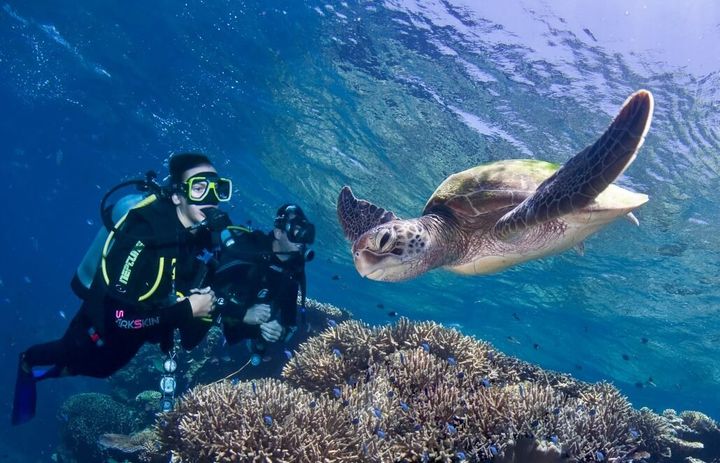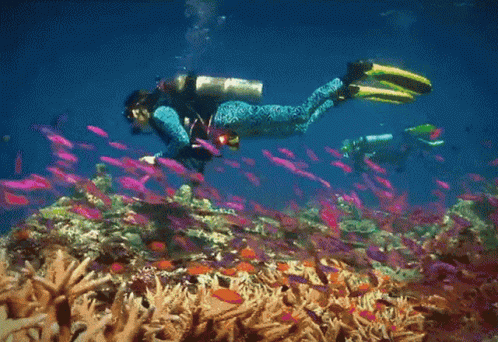Do you think you should have been born as a mermaid or a merman? Are you one of those people that tears (out loud or in private; we won’t judge) whenever you witness wildlife suffering as a result of human activity? Then we’re guessing that marine conservation is your dream career. Are we correct? If that’s the case, you’ve undoubtedly already recognized that pursuing a career in marine conservation isn’t simple.
We understand how difficult it can be to locate the perfect door that leads to a job in marine conservation. That is why we sought guidance from former volunteers with Gili Shark Conservation. They’ve all gone through the struggle of landing their ideal job in marine conservation, but they all succeeded. So, let’s take a look at some of their exclusive tips for pursuing a career in marine conservation.
Take Psychometric Test To Know Your Best Career
Be passionate
The first thing you should do is question yourself if you truly want to work in the field of marine conservation. As a marine conservationist, your chances of becoming wealthy are practically nil. That is why the most crucial thing is to have a real enthusiasm for what you do! If you don’t doubt for a second that marine conservation is the proper path for you, but you’re not sure how to get there, keep reading.

Keep your eyes open for Opportunities
If you want to work in the field of marine conservation, you must actively seek it out. When looking for organizations or forums, make sure they are related to your area of interest. It is not necessary for the organization to post only career, internship, or volunteer opportunities. If you find a post from an organization that you’re interested in, contact them regardless of what they’re advertising.
Instead of focusing on obtaining a career, internship, or volunteer opportunity, try to focus on creating connections. When you broaden your network, more opportunities will present themselves. Keep in mind that hunting for work can be a full-time job in and of itself. If you truly want to work in the field of marine conservation, there is no time for laziness.
Decide your Expertise, but don’t be Picky
If you want to be a marine scientist, it’s best not to put too many restrictions on yourself while you’re first starting out. Keep a holistic strategy in mind, and keep in mind that even if you’re dealing with coral reefs, for example, shark conservation will benefit. After all, they’re both parts of the same ecology.
Know Your Best Careers Take Psychometric Test
Even so, it’s a good idea to stake out a stance and demonstrate your competence. This may become more important later in your journey, but it’s helpful to have a concept of where you want to go. You’ll have a solid resume and profile to present to potential employers once you’ve gained both experience and knowledge.


Go Diving
If you want to learn more about marine conservation, the best method is to immerse yourself in the sea’s salinity. Consider becoming a dive professional to take your diving to the next level. If you spend two months of your time to becoming a divemaster, you will earn invaluable expertise.
Create an Opportunity for Yourself
Are you concerned that you won’t be able to get your desired career in marine conservation because you lack a background in the field? No worries, you’ll still be able to make it! You can always start a project related to marine conservation on your own. Several people suggest that instead of waiting for a chance to reveal itself, you should seize it. Make suggestions for projects, come up with your own ideas, and keep expanding your network.



Find Opportunities to Volunteer and Intern
The most common piece of advice is to volunteer or intern to gain experience. Find a reputable marine conservation group to obtain field experience with. Make the most of every opportunity to go out and gain experience while you’re studying. Even if the ocean is your passion, several types of experience will be beneficial. It’s not just about what’s below the water’s surface when it comes to marine conservation. Working with communities and people from all walks of life is an important part of marine conservation. The goal of marine conservation would be defeated if this were not the case.
Take Psychometric Test To Know Your Best Career
Don’t Give Up
To wrap things up, we’d like to encourage you to keep going. With your initial job application, you have a little chance of landing your dream position in marine conservation. The voyage may be rocky, but we promise that if you keep trying, your efforts will be rewarded. Consider the journey to be the goal in and of itself. Every step along the way will be an opportunity to gain knowledge and experience. Everything will eventually lead to a career in marine conservation.






